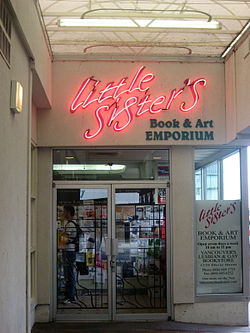Little Sister's Book and Art Emporium
 The shop's main entrance | |
| Company type | Private |
|---|---|
| Industry | Books |
| Founded | Vancouver, British Columbia (1983) |
| Headquarters | 1238 Davie Street Vancouver, British Columbia V6E 1N3 |
Key people | Jim Deva and Bruce Smyth (founders) Janine Fuller (former manager) Don Wilson (manager) |
| Website | littlesisters |
Little Sister's Book and Art Emporium, also known as Little Sister's Bookstore, but usually called "Little Sister's", is an independent bookstore in the Davie Village/West End neighbourhood of Vancouver, British Columbia, Canada. The bookstore was opened in 1983 by Jim Deva and Bruce Smyth, and its current manager is Don Wilson.
Deva died on September 21, 2014[1] and Smyth died on December 31, 2019.[2]
Legal cases
[edit]The bookstore was famously the plaintiff in Little Sisters Book and Art Emporium v Canada, where it challenged Canada Customs' repeated decisions to block its shipments of erotic literature under customs regulations that bar "obscene materials" as a violation of free expression and equality rights.[3] These materials, nearly all dealing with male-male or female-female sexuality, were routinely seized at the border. The same publications, when destined for mainstream booksellers in the country, had often been delivered without delay or question.[4] Glad Day Bookshop, an LGBT bookstore in Toronto, has faced similar difficulties.[3]
... [A]lternative culture and lifestyles, including manuals and handbooks on safe sex (?!) were proclaimed indecent by someone who has no right to judge them in his/her bias/bigotry, which violates the anti-discrimination protection of the Charter of Rights and Freedoms guaranteeing equality of all Canadians. Not to mention that five out of ten provinces (plus one of the two territories) explicitly forbid discrimination based on sexual orientation.
— Miodrag Kojadinović: "Trials and Tribulations", Angles magazine, Vancouver, October 1993
Little Sister's filed their claim against the federal government in 1990 but the case stalled and was not heard by the Supreme Court of British Columbia until October 1994.[5] The court ruled in January 1996 that Little Sister's shipments had been wrongly delayed or withheld due to the "systemic targeting of Little Sisters' importations in the Customs Mail Center" but did not strike down the legislation. The court ruled that banning importation of obscene material, while a violation of section 2 of the Charter, constituted a reasonable limit under section 1 and that there was no violation of the equality rights under section 15.[6] Little Sister's appealed the latter portion of the decision to the British Columbia Court of Appeal, which agreed with the lower court.
Little Sister's appealed to the Supreme Court of Canada in 2000. The court agreed with the lower courts that customs authorities had unfairly targeted shipments to the bookstore and that the laws on obscene material were contrary to section 2 of the Charter but saved under section 1. However, the court also ruled that the provisions of the Customs Act which placed the onus on the importer to disprove obscenity were unconstitutional. The case established that a Charter right to import expressive material unless the government proves it is obscene or otherwise illegal.[7]
The bookstore's travails were fictionalized as a subplot of the film Better Than Chocolate. A feature-length documentary film by Aerlyn Weissman, Little Sister's vs. Big Brother (2002), has also been released about the bookstore.[3] Former manager Janine Fuller was also a coauthor with Stuart Blackley of the book Restricted Entry: Censorship on Trial, a non-fiction account of the Little Sister's battle, and wrote an introduction for Forbidden Passages: Writings Banned in Canada, an anthology of excerpts from some of the impounded works which was edited by Patrick Califia.[8] Both books were published in 1995, and were awarded Lammys at the 8th Lambda Literary Awards ceremony in 1996. Additionally, the book What right?: Graphic interpretations against censorship addressed the court case in the form of a graphic novel, with proceed from sales of the book being donated to the Little Sister's Defense fund to assist with legal challenges with Canada Customs. The book features contributions from a number of comic artists including Alison Bechdel and Marc Bell.
See also
[edit]- Little Sisters Book and Art Emporium v. Canada (Minister of Justice), [2000] 2 S.C.R. 1120
- Spartacus Books, another bookstore in Vancouver with a wide "queer lit" section
- Feminist bookstore
- Gay's the Word (bookshop)
Notes
[edit]- ^ "Jim Deva, owner of Little Sister's bookshop, dead at 64". CBC News. September 22, 2014. Retrieved June 19, 2021.
- ^ "Bruce Smyth, Co-Founder Of Iconic Vancouver Store "Little Sister's," Passes Away". The Evening Voice. 2019-12-31. Retrieved 2019-12-31.
- ^ a b c "A tale of two bookstores" Archived 2013-03-01 at the Wayback Machine. Xtra!, January 19, 2006.
- ^ see Little Sisters Book and Art Emporium v. Canada (Minister of Justice) at paras. 12, 112 and 116
- ^ Fuller, Janine; Blackley, Stuart (1995). Restricted entry : censorship on trial. Vancouver, B.C.: Press Gang Publisher. p. 19. ISBN 9780889740532.
- ^ Little Sisters Book and Art Emporium v Canada (Minister of Justice), 131 D.L.R. (4th) 486, 18 B.C.L.R. (3d) (B.C.S.C. 1996).
- ^ Little Sisters Book and Art Emporium v Canada (Minister of Justice) (SCC 69 2000), Text.
- ^ "Censorship Trial Spawns Books". Cuir, March/April 1996.
External links
[edit]- Independent bookstores of Canada
- LGBTQ culture in Vancouver
- LGBTQ bookstores
- Censorship in Canada
- Canadian companies established in 1983
- Retail companies established in 1983
- 1983 establishments in British Columbia
- Shops in Vancouver
- LGBTQ organizations based in Canada
- LGBTQ history in Vancouver
- LGBTQ literature in Canada
- West End, Vancouver
- LGBTQ places in Canada
